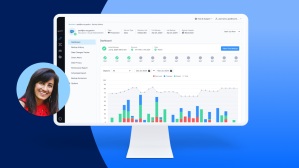Demand for artificial intelligence, and talent with AI expertise, has surged in recent years. This comes along with industry growth — a reported 95% of enterprises consider AI technology to be important to their digital transformation efforts.
With rising demand comes a need for technical employees who are capable of not only building and deploying AI and automation technology, but doing so responsibly. There are now 37,000 AI job postings in the first quarter of 2021, up more than 45% from the fourth quarter of 2020, and an Analytics Insight report projects more than 20 million available jobs in artificial intelligence by 2023.
AI talent can drive innovation that boosts a company’s bottom line, but the inverse can have an equally detrimental impact. In fact, 39% of companies cite the lack of technical expertise as a leading reason for slower AI adoption.
Here are four ways that Salesforce believes companies can stay ahead of the curve.
1. Recruiting: Broadening the search for talent
Companies can increase their AI talent pool by expanding beyond the obvious search criteria, and instead focusing on the related skills to find talent that’s hiding in plain sight.
Whereas LinkedIn is a primary source of talent for sales, marketing and other roles, AI experts often establish credibility through academic networks, scientific publications, conferences and more. Recruiters can reference sites like arXiv.org to see the latest AI research papers by industry to glean insight about lesser-promoted, but highly qualified talent. Employees’ networks are a particularly efficient channel for finding relevant talent.
Consider tapping into a university system to find the next generation of talent. For example, Salesforce partnered with more than 700 universities and colleges worldwide to help students learn in-demand skills that led directly to jobs — within and outside of Salesforce.
2. Diversifying: Being purposeful about seeking representative talent
While less frequent in skills-related conversations, one of the most important considerations for building AI teams is the role of diversity and ethics. As my colleague Kai Nunez pointed out, diversity in its broadest form is required when developing technology – diverse in the sense of race, socioeconomic status, neurodiversity, age, gender, technology aptitude and accessibility, among other areas.
There’s a greater likelihood of unintended effects in how AI and automation products are conceived, developed and implemented when those working on the technology fail to reflect the diversity of the general population.
More tactically, the emerging role of the AI ethicist is one of the more recent developments in the industry. An AI ethics officer is works closely with numerous stakeholders, including internal development and legal teams, government agencies, nonprofits and privacy groups.
As Kathy Baxter, Salesforce’s Principal Architect of Ethical AI, explained, “AI ethics officers must have a passion for technology but also a healthy skepticism… they need to frequently ask not just ‘can we do this?’ but ‘should we do this?’”.
3. Developing: Focusing on both soft and hard skills
AI is a broad term, encompassing general artificial intelligence, machine learning, data mining, data science and more. The industry must demystify which skills are necessary in order to create academic or training systems to foster such talent.
- Machine learning engineers are among the most in demand and bring a comprehensive understanding of computer programming and mathematical skills. What to look for: These candidates should understand predictive models and natural language processing across massive data sets, as well as software development methodologies, agile practices and a range of software development tools. These individuals should understand computer science or mathematics, and bring a working knowledge of modern programming languages like Python, Java, and Scala.
- Data scientists are those who collect, analyze and interpret large data sets to gain insights beyond statistical analysis. What to look for: An ability to understand unstructured data. Fluency in programming languages, including structured query language (SQL), Python, Scala, and Perl, and statistical computing languages is key. Big Data platforms and tooling expertise is preferred, including Hadoop, Pig, Hive, Spark, and MapReduce.
- Business intelligence developers analyze complex data and look for current business and market trends with the goal of increasing profitability and efficiency. What to look for: Experience in computer science, engineering or a related field, or a combination of certifications and on-the-job experience are preferred for this role. Prioritize experience in data warehouse design, data mining and knowledge of BI technologies.
All of these roles benefit from a solid understanding how to develop AI responsibly (i.e. curating representative data sets, assessing bias in data sets and models, identifying and monitoring for unintended consequences).
4. Re-skilling: Training the next generation of AI talent
Companies often overlook the most immediate pipeline of prospective AI talent – their existing employees. By developing company- and industry-specific curriculum, organizations can more easily provide re-skilling resources to not only retain talent, but expand skillsets.
Trailhead, Salesforce’s free online learning platform, is one example. It helps anyone learn skills for in-demand jobs in the Salesforce ecosystem. Trailhead has learning content focused on artificial intelligence, where anyone can deepen their understanding of topics like AI trends in CRM, how AI can help them meet their business needs, how to build AI responsibly and more.
And it works. More than 50% of people who used Trailhead credit the platform as helping secure a promotion or raise at their current company.
Of course, to increase the talent pool at large, re-skilling outcomes must support the industry at large. Here’s how we’re approaching that effort:
- Creating programs like the Talent Alliance to connect partner companies to a diverse pool of qualified candidates and the Pathfinder Training Program, designed to train individuals with the technical, business and soft skills they need to pursue a career in the Salesforce ecosystem.
- Offering free, online training classes and certification exams through Salesforce Military, at no cost for active-duty military, veterans, and military spouses.
- And, helping people connect to mentorship and career opportunities through events and online resources using Trailblazer Connect.
The difference between good and great AI talent is often a matter of both strong communication and analytical skills, intellectual curiosity and a business acumen. By approaching the skills gap with fresh eyes, any company can find the right talent to move AI adoption forward.



















